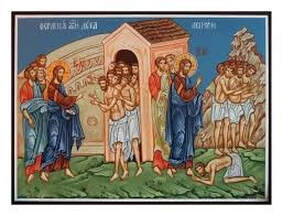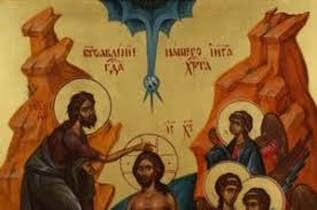 When we arrive at this particular Sunday, we know that Great Lent will soon follow, and we shall be able to more appropriately address the challenge it makes. Ten Lepers came to our lord for healing and this request was granted. They went away joyfully and excited, yet only one returned to say thank you. There was indeed need for great thankfulness. The life of a Leper in those days was challenging and full of misery. Our present “lock-downs” are devastating enough but, at least, are only temporary. For the one suffering from leprosy, it was a lifelong curse, only changed in recent times. The illness is contagious and, hence, to avoid its spread, the sufferer was separated from his/ her family, forbidden to meet with others, unable to attend Synagogue and, often, without means of livelihood. We are reminded of this in our own history when, in earlier times, Lepers could only receive communion at the Leper window without entering the Church (such a window is to be found at St Leodegarius). All were made to live away from the community in special hostels and required to ring a bell to warn every one of their presence when out and about. To be cured of the disorder of leprosy and again be admitted as a full member of community and be reunited with family and friends was an immense blessing and ground on which to be immensely thankful. No doubt all ten in the Gospel story were indeed grateful but only one retuned to Our lord to say, thank you! This story is a challenge for us, as we begin to prepare for Great Lent (still some weeks away), it is good to be aware that we too, like the nine, can, perhaps in exuberance, so easily forget to be thankful for all the blessings and gifts which God has poured upon us. It is so easy to take for granted and to forget. Lent will be a time to remedy this. We enter Great Lent, not to be miserable and chastened harshly but, among other things, to give thanks as we seek refreshment and newness of life. A clue to thankfulness is indicated in the Epistle for the day, 1Timothy 4: 9-15: “...be an example... in word, in conduct, in love, in spirit, in faith, in purity.... Do not neglect the gift that is in you, which was given to you........Meditate on these things; give yourself entirely to them... Continue in them, for in doing this you will save both yourself and those who hear you."! ! ! ! ! ! ! ! ! These are words of St Paul to encourage the new priest Timothy but are for all of us, in the priesthood of all believers. We hope that the Leper who returned to Our Lord became one of His disciples and learned to move into a greater fullness of life. Now that he was free of his affliction, he would indeed be able to accept and understand the life changing words given to the Apostle Timothy. Perhaps he was able to become a good witness of what life with Jesus was like, changed from outcast to inner disciple, restored. This is what we hope for ourselves and what Lent is about when we enter into what this season has to offer. Lent gives us a special set aside time to ensure that we do not neglect the gift that is in us. Great Lent leads us into greater thankfulness for what God has poured upon us and into our lives in a time for restoration. Thankfulness is the most important part of prayer; it pleases God and lifts up our own hearts. In our Christian life, our conduct, our outreaching love, the Spirit which governs our life and makes us more fully human, with firm faith and purity, in which we find ourselves. As one Father said, when visited by a group who were disappointed that he had nothing to say to them, replied “If you are not edified by my presence, you will not be edified by my words. The quality of our life is what counts and speaks more than words. Freed of limitation, as were the ten Lepers, so we, freed from whatever has been restricting us, enables us to stand thankfully in Christ and then, our presence in the world around, radiates His love and His saving grace. The society in which we live, so damaged by the Corona virus and the reaction to it, needs us, as committed, dutiful Christians, to proclaim by our witness that the foundations of this Nation are Christian, and only when its peoples return to an awareness and commitment to God the Creator Redeemer, will life be able to be on a sounder footing. Let all, like the tenth Leper, return to Christ with hearts of gratitude and thanksgiving.
0 Comments
 Well, whichever calendar you are using you will have now celebrated the feast of the Nativity and I do hope that it was truly blessed and joyful for you; although I am sure it wasn’t the celebration that you had planned! I was delighted to receive a really interesting book as one of my Christmas presents this year. The book, written by ‘Countdown’s’ Susie Dent, is an entertaining look at Etymology (the study of the origin of words and the way in which their meanings have changed throughout history). Have you ever come across ‘Janus words’, named after the Roman deity? Janus was traditionally depicted as having two faces which inspired several terms in English. Janus cloth, for example, is a reversible material, while a Janus lock can be fitted to either a left- or right-opening door. But perhaps the most enduring legacy of the two-faced deity is ‘Janus word': a term that has two diametrically opposed meanings. An example of a ‘Janus word’ would be ‘Dust’; to make free of dust; to sprinkle with dust. Or how about ‘Left’: went away from; remaining – I love this stuff! Going back to Christmas and the Feast of the Nativity, from the Latin term nativus, which means "born.", this a time of year when our imaginations tend to focus on the human family, with the occasional thought for the divine Father–Son relationship that is to be made visible in the obedient, loving life of Jesus of Nazareth. Much of Christmas can go by without mentioning the Holy Spirit. But God is Trinity – Father, Son and Holy Spirit – and all of God is involved in everything God does, including the Christmas gift. Today, we celebrate together, the Holy Theophany of Our Lord. The feast is called Theophany because at the baptism of Christ the Holy Trinity appeared clearly, to mankind, for the first time—the Father's voice is heard from Heaven, the Son of God is incarnate and standing physically in the Jordan, and the Holy Spirit descends on Him in the form of a dove. Troparion: Lord, when You were baptized in the Jordan, the worship of the Trinity was made manifest. For the voice of the Father gave witness to You, calling You Beloved; and the Spirit, in the form of a dove, confirmed the certainty of His words. Glory to You, Christ our God, who appeared and enlightened the world. As Orthodox Christians when we worship Gd we are worshiping the Father, Son, and Holy Spirit—the Holy Trinity, the one God. Following the teaching of the Holy Scriptures and the Church Fathers, the Church believes that the Trinity is three divine persons (hypostases) who share one essence (ousia). All three persons of the Trinity are consubstantial with each other, that is, they are of one essence (homoousios) and coeternal. There never was a time when any of the persons of the Trinity did not exist. God is beyond and before time and yet acts within time, moving and speaking within history. Now I’m not sure if it is ‘Janus’ or paradoxical to believe thus, but that is how God has revealed himself. The source and unity of the Holy Trinity is the Father, from whom the Son is begotten and also from whom the Spirit proceeds. Thus, the Father is both the ground of unity of the Trinity and also of distinction. To try to comprehend unbegottenness (Father), begottenness (Son), or procession (Holy Spirit) leads to insanity, says Saint Gregory the Theologian. I think C S Lewis gives us a lovely illustration of the inability of our minds to comprehend God. He writes, “Let us suppose a mystical limpet, a sage among limpets, who (rapt in vision) catches a glimpse of what Man is like. In reporting it to his disciples, who have some vision themselves (though less than he) he will have to use many negatives. He will have to tell them that Man has no shell, is not attached to a rock, is not surrounded by water. And his disciples, having a little vision of their own to help them, do get some idea of Man …. a sort of amorphous jelly (he has no shell) existing nowhere in particular (he is not attached to a rock) and never taking nourishment (there is no water to drift it towards him)”. I’m sure you get the picture. The point I am trying to make here is that we approach God in divine mystery, approaching God apophatically. That is understanding that God's essence is unknowable, recognising the inadequacy of human language to describe God; being content to encounter God personally and yet realize the inadequacy of the human mind to comprehend Him. And as we rejoice in the Holy Theophany let us remember that the baptism of Our Lord has been prepared since the creation of the world’ (Gen1:1In the beginning, God created the heavens and the earth). God the Father, creator of all things, presides at creation. The Spirit and the Word work with him, like the two hands of the Father. (Gen 1:2 The Spirit of God was moving over the face of the waters) Water, connected to the Spirit, is the element indispensable for life. The Spirit’s moving over the waters is the first image of the dove spreading its wings to fertilise the waters and to call life forth from it. (Gen 1:3 God said: “let there be light”; And there was light. The Word of God, the creative word, orders the elements and makes them to appear out of nothing. The earth without form or content (chaos or the desert) is the image of nothingness. In the desert, on the banks of the Jordan, the Trinity reveals itself in its work of creation. This is a new genesis for a new creation. The world, through the Spirit, is regenerated in the person of Christ, the new Adam. Canticle Five (Forefeast of Theophany) O Creator, who art the new Adam, Thou makest knew those born on earth, and Thou bringest to pass a strange regeneration and a wonderful restoration by fire and Spirit and water: without destruction or melting pot Thou dost renew mankind through the holy sacrament of baptism. Through the spirit dost Thou make souls knew and through the water dost Thou sanctify our body compounded from the elements, forming man afresh as a living being. For in wiser forethought, as physician alike of bodies and of souls, with profit Thou dost minister the remedies befitting both. Fr Julian |
Parish Blog
This mainly contains homilies and messages from our priests, although there is some scope to share thoughts and interesting articles which we may want to share with others Archives
October 2022
Categories |
 RSS Feed
RSS Feed